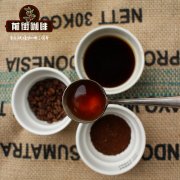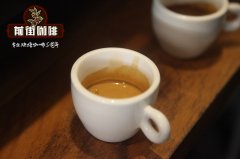What if the coffee doesn't taste good? Coffee doesn't taste good. Weird beans?

Professional coffee knowledge exchange more coffee bean information please follow the coffee workshop (Wechat official account cafe_style)
Have you ever been in a situation where you spent a lot of time studying the origin, understanding the way it was baked, and confirming when it was done, and finally chose a coffee bean, took it home, and looked forward to grinding and cooking it on a weekend morning? However, the coffee you get is not as delicious as you think. And then what would you do? Would you like to give up this bean and change it for another one? Wait a minute, maybe you really misjudged your coffee beans. The barista's advice to you may be to try a change of water.
Water is an important ingredient in a cup of coffee, accounting for about 90% of espresso and 98.5% of follicular coffee. If the water used to make coffee is not delicious in the first place, the coffee can never be delicious. If you can taste the chlorine in the water, the coffee will taste terrible. In most cases, you can effectively remove the negative taste by using a water filter containing activated carbon, but you may not be able to get the perfect water quality for brewing coffee.
In the brewing process, water acts as a solvent and is responsible for extracting flavor components from coffee powder. Because the hardness and mineral content of water will affect the extraction efficiency of coffee, water quality is very important.
Hardness
The hardness of the water is the number of scale (calcium carbonate) in the water, which is caused by the local bedrock structure. Heating the water will cause the scale to dialyze out of the water, and over a long period of time, the chalk-like white matter begins to accumulate. People who live in hard water areas often have this problem, such as hot kettles, showerheads and dishwashers that accumulate scale.
The hardness of water has a great influence on the interaction between hot water and coffee powder. Hard water will change the proportion of soluble substances in coffee powder, and then change the proportion of chemical composition of coffee juice. Ideal water contains a small amount of hardness, but if the content is too high or even extremely high, it is not suitable for making coffee. High-hardness brewed coffee lacks layering, sweetness and complexity, and from a practical point of view, soft water is an important condition when using any coffee machine that requires hot water, such as a follicle coffee machine or an espresso machine. The scale accumulated in the machine can quickly cause machine failure, so many manufacturers will consider not providing warranty services to hard water areas.
Mineral content
Apart from being delicious and having only a little hardness, we don't want the water to contain too much ── except for relatively low levels of minerals. The mineral water manufacturer will list different mineral contents on the bottle, and will usually tell you the total solid content in the water (total dissolvedsolids, TDS), or the value of the drying residue at 180 ℃.
Perfect water quality
A recommendation on the perfect water quality of brewed coffee published by the American Fine Coffee Association (Specialty CoffeeAssociation of America, SCAA) is shown in the table below. To know the state of water quality in your area, you can seek the assistance of water filter companies or search the Internet for information. Most filter equipment companies must publish their water quality data on the Internet. If you can't find such information, you can also go to the pet store and buy a set of water quality inspection tools (usually used to detect the water quality of the aquarium), which should be enough to provide you with accurate values of key elements.
The information may be dazzling, but it can be summarized as follows:
If you live in an area where the water quality is moderately soft, just add a water filter to improve the taste of the water.
If you live in an area where the water quality is hard, the best solution now is to buy bottled drinking water to make coffee and buy bottled water according to the above criteria. Supermarket brand bottled water is usually lower in mineral content than big brands. I can't advertise bottled water brands in the book. I can only suggest that in order to brew coffee with the best flavor, you must find the most suitable water quality for brewing.
Important Notice :
前街咖啡 FrontStreet Coffee has moved to new addredd:
FrontStreet Coffee Address: 315,Donghua East Road,GuangZhou
Tel:020 38364473
- Prev

The Cooking method of French filter Pot French Press
Professional coffee knowledge exchange more coffee bean information Please pay attention to the coffee workshop (Wechat official account cafe_style) French filter kettle French Press brewing method, or French pressure pot, also known as French Press, is the most simple and convenient way to make coffee. In fact, this kind of pot appeared a long time ago, but people used to use it to make tea. Usually vesicle
- Next

What kinds of espresso do you have? What's the difference between six espresso and American coffee?
Professional coffee knowledge exchange more coffee bean information please pay attention to the coffee workshop (Wechat official account cafe_style) more Chen Hao effect, everyone should taste coffee. In recent years, in addition to large chain stores, many boutique coffee shops have opened, and people's demand for coffee is getting higher and higher. You drink coffee every day.
Related
- Beginners will see the "Coffee pull flower" guide!
- What is the difference between ice blog purified milk and ordinary milk coffee?
- Why is the Philippines the largest producer of crops in Liberia?
- For coffee extraction, should the fine powder be retained?
- How does extracted espresso fill pressed powder? How much strength does it take to press the powder?
- How to make jasmine cold extract coffee? Is the jasmine + latte good?
- Will this little toy really make the coffee taste better? How does Lily Drip affect coffee extraction?
- Will the action of slapping the filter cup also affect coffee extraction?
- What's the difference between powder-to-water ratio and powder-to-liquid ratio?
- What is the Ethiopian local species? What does it have to do with Heirloom native species?

